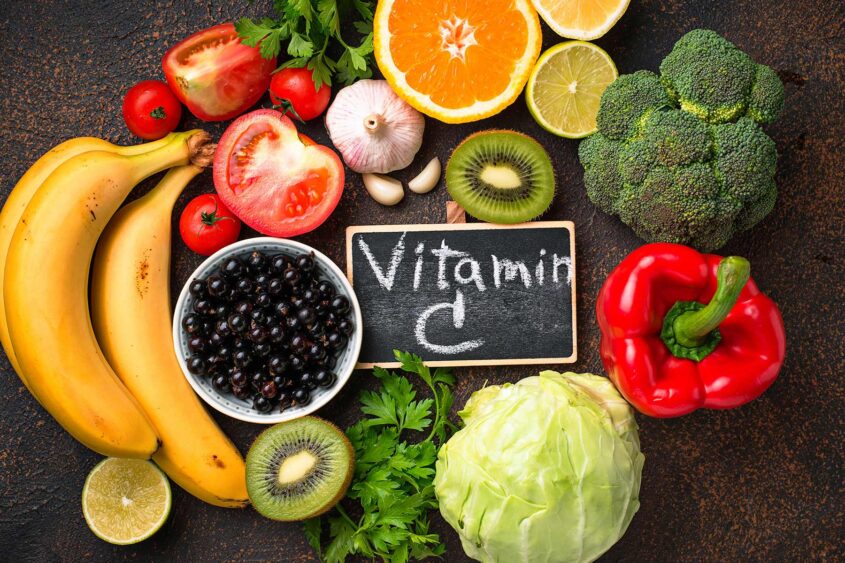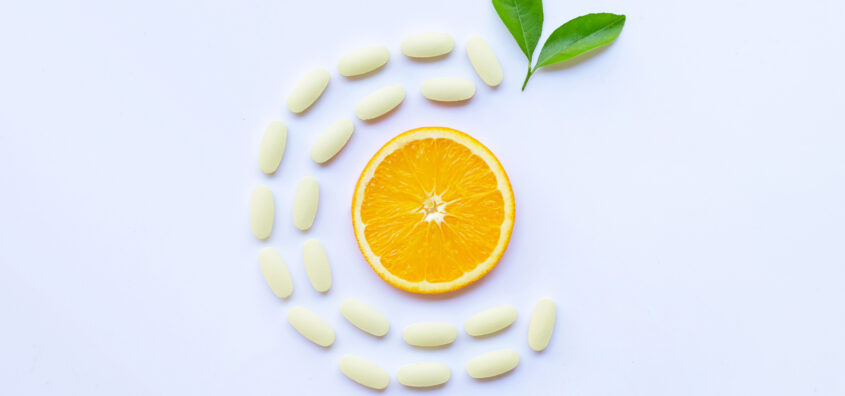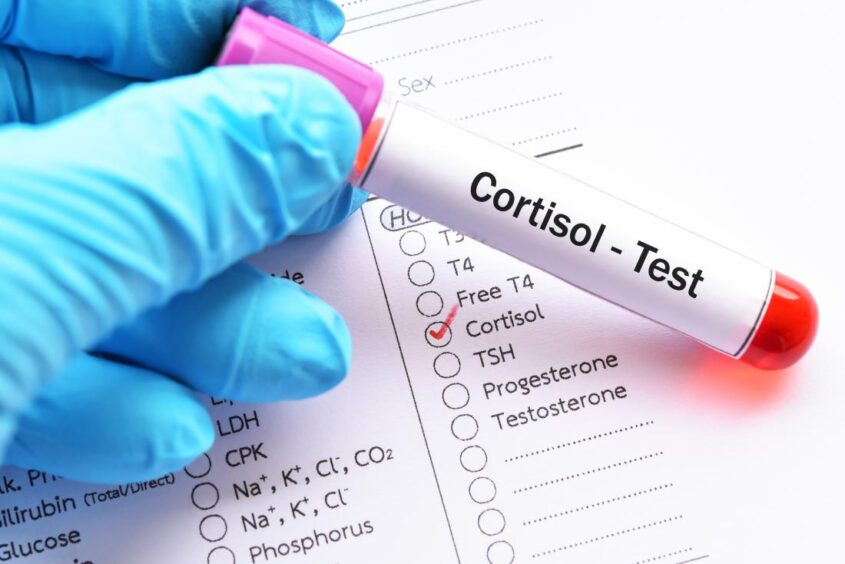
The majority of people only know and see vitamin C as a supplement that they take to help improve their health. However, not everyone understands how important and essential it is to include it in their diets and that it also helps in working out and muscle recovery. You should thoroughly read about vitamin C, especially if you’re living an active lifestyle.
What Is It?
Vitamin C is generally known as ascorbic acid and is considered as one of the safest and most essential supplements in the market. Before people go out and buy specific medications, vitamin C is one of the first remedies they take because, most of the time, it does the job in an instant.
It’s also water-soluble, meaning it can easily dissolve in water, which is why the body can quickly eliminate excessive amounts with the kidneys. Don’t worry if you drank more than the standard limit of vitamin C in a day, because your body can excrete it after roughly 24 hours.
The General Role Of Vitamin C In The Body

Antioxidative Properties
This vitamin is an excellent antioxidant. Antioxidants help your cells avoid or remove the damage that radicals cause. These radicals are the results of the process of converting ingested food into energy for your body or when you’re exercising. It’s also believed that vitamin C can reduce cell damage caused by the inhalation of smoke or the ingestion of foreign chemicals.
Collagen Production
Vitamin C is a significant cofactor needed to produce collagen, a structure that helps build up the skin, bones, ligaments, tendons, and muscles. When the body has enough collagen, it also helps in wound healing because it attracts new skin cells toward the damaged area to start recovery. The cosmetic industry highly recommends collagen to improve the skin and make it look younger.
Protein Metabolism

When you get viral infections, protein metabolism is one of the essential processes that allow the virus to continue producing more copies of itself. Vitamin C helps stop this production process and blocks the synthesis of the proteins that cause infections and damage to the cells.
Strengthens Blood Vessels
This supplement is also popular thanks to its properties that help strengthen your blood vessels. As mentioned earlier, it takes part in creating different proteins like collagen, which help build up and improve different essential elements of the body. As a result, your blood vessels can better withstand high pressure because the walls are further developed and strengthened by your intake of vitamin C.
Why Do Experts Recommend Vitamin C For Workouts?

Reduction Of Oxidative Stress
When you exercise, your cells undergo oxidative stress and result in ROS production (reactive oxygen species). However, these ROS can become harmful to the body if not eliminated quickly and if the levels are higher than usual. While the human body typically can get rid of these radicals, workouts double the levels, making it challenging to keep up. As mentioned earlier, vitamin C is an excellent antioxidant, and it can help eliminate free radicals.
In a study conducted by Ristow et al., the researchers wanted to determine if their vitamin C intake affected the levels of free radicals. They tested on two groups: one with vitamin C and E intake and the other without any supplementation. The results showed that the individuals who drank supplements showed no increase in free radical levels.
Lowering Of Cortisol Levels

Cortisol is the primary hormone when the body is in a “fight or flight” mode. Although this hormone is significant for quick responses and functions such as digestion, blood pressure, and sleeping patterns, increased cortisol levels can damage the body in many ways. Mainly, when you workout and your cortisol levels skyrocket, it contributes to tissue and muscle breakdown.
While most of the population typically have cortisol levels that go back to normal after a few hours, others maintain a higher than average level. Drinking vitamin C helps reduce cortisol levels and therefore block any muscle or tissue breakdown. Take note that muscles develop after a workout, and increased cortisol won’t help with that.
Reduces Muscle Pain

Workouts almost always result in sore muscles and body pain. Not many people know it, but vitamin c (sometimes combined with vitamin E) is a great solution to reduce muscle damage. According to a study conducted by Taghiyar et al., the researchers tested on female athletes and wanted to see if supplements help alleviate muscle pain.
The results showed that both vitamin C and E played a significant role in the reduction of muscle pain brought about by several exercises and activities done by the subjects.
Tissues And Muscles Heal

Vitamin C is a vital component in the production of collagen, a building block for muscles, tissues, ligaments, and many more. If you continuously intake vitamin C, you also continually replenish your body’s supplement levels. Therefore, collagen production is enough to recharge and heal your overworked muscles.
Vitamin C Strengthens Your Immune System
In general, vitamins are a great source of components that help your immune system fight off infections, diseases, and sicknesses. Engaging in workouts or strenuous activities can leave you extremely tired, and sometimes, it might compromise your immune system. Drinking vitamin C allows your body to recuperate and strengthen overall.
How Much Should You Take?

For individuals who engage in strenuous activities such as bodybuilders and athletes, the need for vitamin C is greater than the average person, of course. The amount of supplements these individuals should take per day is around 500 mg up to 3,000 mg, depending on their activities.
Although it was previously mentioned that vitamin C gets easily excreted when taken in excessive amounts, you should still drink the correct dosage for your age, mainly if you don’t engage as much in strenuous activities. If you continuously drink excessive amounts of vitamin C, it may cause acidity and other health problems.
If you’re not on the level yet of bodybuilders and athletes but still wish to reap the benefits of vitamin C, here are the guidelines that the Food And Drug Administration released for the correct dosage according to age:
Infants And Children:
| Age | Dosage |
| 0 to 6 months | 40 mg/day |
| 7 months to 1 year old | 50 mg/day |
| 1 to 3 years old | 15 mg/day |
| 4 to 8 years old | 25 mg/day |
| 9 to 13 years old | 45 mg/day |
Adolescents:
| Girls | Boys | |
| 14 to 18 years old | 65 mg/day | 75 mg/day |
Adults:
| Women | Men | |
| 19 years old and above | 75 mg/day | 90 mg/day |
Different Sources Of Vitamin C

Keep in mind that the body cannot produce its own levels of vitamin C, that’s why individuals need to drink supplements or ingest foods that are rich in the supplement they need. Here are the primary sources that you should know about:
- Oranges
- Pineapple
- Papaya
- Mango
- Red cabbage
- Tomatoes
- Strawberries
- Brussel sprouts
- Watermelon
- Cantaloupe
- Broccoli
- Green and red pepper
- Kiwi
- Blueberries
- Cranberries
- cauliflower
Conclusion

It is recommended to ask your doctor for additional advice regarding vitamin C., but overall, there are numerous benefits and advantages that you can get from this supplement. Whether you’re an athlete in training or someone who wants to lose weight, it’s always essential to put your health first above anything else. Check out couponlawn.com for health and wellness deals and weight-loss courses that suit your supply of vitamin C!











